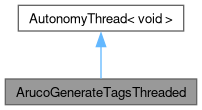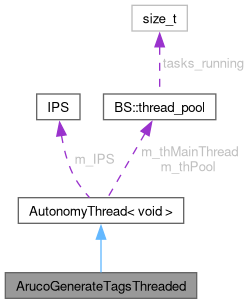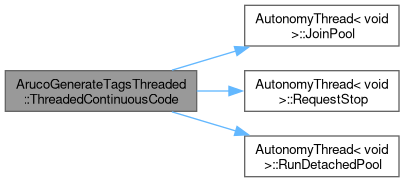This class inherits the AutonomyThread interface and implements the threaded container methods. It also utilizes the ability to create a thread pool of subroutines and the ability to parallelize loops.
More...
#include <ArucoGenerateTags.hpp>
|
| void | SetNumTagsToGenerate (const int nNumTags) |
| | Mutator for the Num Tags To Generate private member. Given number must not exceed the dictionary type limit.
|
| |
| void | AddTagDictionaryType (const cv::aruco::PredefinedDictionaryType eDictionary) |
| | Mutator for the Tag Dictionary Type private member.
|
| |
| | AutonomyThread () |
| | Construct a new Autonomy Thread object.
|
| |
| virtual | ~AutonomyThread () |
| | Destroy the Autonomy Thread object. If the parent object or main thread is destroyed or exited while this thread is still running, a race condition will occur. Stopping and joining the thread here insures that the main program can't exit if the user forgot to stop and join the thread.
|
| |
| void | Start () |
| | When this method is called, it starts a new thread that runs the code within the ThreadedContinuousCode method. This is the users main code that will run the important and continuous code for the class.
|
| |
| void | RequestStop () |
| | Signals threads to stop executing user code, terminate. DOES NOT JOIN. This method will not force the thread to exit, if the user code is not written properly and contains WHILE statement or any other long-executing or blocking code, then the thread will not exit until the next iteration.
|
| |
| void | Join () |
| | Waits for thread to finish executing and then closes thread. This method will block the calling code until thread is finished.
|
| |
| bool | Joinable () const |
| | Check if the code within the thread and all pools created by it are finished executing and the thread is ready to be closed.
|
| |
| AutonomyThreadState | GetThreadState () const |
| | Accessor for the Threads State private member.
|
| |
| IPS & | GetIPS () |
| | Accessor for the Frame I P S private member.
|
| |
|
| void | ThreadedContinuousCode () override |
| | This code will run in a separate thread. This is the main code.
|
| |
| void | PooledLinearCode () override |
| | Any highly parallelizable code that can be used in the main thread goes here.
|
| |
|
| enum | AutonomyThreadState |
| |
| void | RunPool (const unsigned int nNumTasksToQueue, const unsigned int nNumThreads=2, const bool bForceStopCurrentThreads=false) |
| | When this method is called, it starts/adds tasks to a thread pool that runs nNumTasksToQueue copies of the code within the PooledLinearCode() method using nNumThreads number of threads. This is meant to be used as an internal utility of the child class to further improve parallelization. Default value for nNumThreads is 2.
|
| |
| void | RunDetachedPool (const unsigned int nNumTasksToQueue, const unsigned int nNumThreads=2, const bool bForceStopCurrentThreads=false) |
| | When this method is called, it starts a thread pool full of threads that don't return std::futures (like a placeholder for the thread return type). This means the thread will not have a return type and there is no way to determine if the thread has finished other than calling the Join() method. Only use this if you want to 'set and forget'. It will be faster as it doesn't return futures. Runs PooledLinearCode() method code. This is meant to be used as an internal utility of the child class to further improve parallelization.
|
| |
| void | ParallelizeLoop (const int nNumThreads, const N tTotalIterations, F &&tLoopFunction) |
| | Given a ref-qualified looping function and an arbitrary number of iterations, this method will divide up the loop and run each section in a thread pool. This function must not return anything. This method will block until the loop has completed.
|
| |
| void | ClearPoolQueue () |
| | Clears any tasks waiting to be ran in the queue, tasks currently running will remain running.
|
| |
| void | JoinPool () |
| | Waits for pool to finish executing tasks. This method will block the calling code until thread is finished.
|
| |
| bool | PoolJoinable () const |
| | Check if the internal pool threads are done executing code and the queue is empty.
|
| |
| void | SetMainThreadIPSLimit (int nMaxIterationsPerSecond=0) |
| | Mutator for the Main Thread Max I P S private member.
|
| |
| int | GetPoolNumOfThreads () |
| | Accessor for the Pool Num Of Threads private member.
|
| |
| int | GetPoolQueueLength () |
| | Accessor for the Pool Queue Size private member.
|
| |
| std::vector< void > | GetPoolResults () |
| | Accessor for the Pool Results private member. The action of getting results will destroy and remove them from this object. This method blocks if the thread is not finished, so no need to call JoinPool() before getting results.
|
| |
| int | GetMainThreadMaxIPS () const |
| | Accessor for the Main Thread Max I P S private member.
|
| |
|
IPS | m_IPS |
| |
This class inherits the AutonomyThread interface and implements the threaded container methods. It also utilizes the ability to create a thread pool of subroutines and the ability to parallelize loops.
- Author
- ClayJay3 (clayt.nosp@m.onra.nosp@m.ycowe.nosp@m.n@gm.nosp@m.ail.c.nosp@m.om)
- Date
- 2023-07-27
◆ ThreadedContinuousCode()
| void ArucoGenerateTagsThreaded::ThreadedContinuousCode |
( |
| ) |
|
|
inlineoverrideprivatevirtual |
This code will run in a separate thread. This is the main code.
- Author
- ClayJay3 (clayt.nosp@m.onra.nosp@m.ycowe.nosp@m.n@gm.nosp@m.ail.c.nosp@m.om)
- Date
- 2023-07-23
Implements AutonomyThread< void >.
48 {
49
50
52
53
55
56
58 }
void RequestStop()
Signals threads to stop executing user code, terminate. DOES NOT JOIN. This method will not force the...
Definition AutonomyThread.hpp:164
void RunDetachedPool(const unsigned int nNumTasksToQueue, const unsigned int nNumThreads=2, const bool bForceStopCurrentThreads=false)
When this method is called, it starts a thread pool full of threads that don't return std::futures (l...
Definition AutonomyThread.hpp:336
void JoinPool()
Waits for pool to finish executing tasks. This method will block the calling code until thread is fin...
Definition AutonomyThread.hpp:439
◆ PooledLinearCode()
| void ArucoGenerateTagsThreaded::PooledLinearCode |
( |
| ) |
|
|
inlineoverrideprivatevirtual |
Any highly parallelizable code that can be used in the main thread goes here.
This is not required and is only used at the users convenience.
- Author
- ClayJay3 (clayt.nosp@m.onra.nosp@m.ycowe.nosp@m.n@gm.nosp@m.ail.c.nosp@m.om)
- Date
- 2023-07-25
Implements AutonomyThread< void >.
71 {
72
73 std::unique_lock<std::mutex> lock(m_muDictMutex);
74
76 m_vDictionaries.pop_back();
77
78 lock.unlock();
79
81
82
84 bool bUseParallelLoop = false;
85 if (bUseParallelLoop)
86 {
88
89
92 m_nNumTagsToGenerate,
93 [&cvDictType](const int a, const int b)
94 {
95
96 for (int i = a; i < b; ++i)
98 });
99 }
100 else
101 {
103
105 for (int i = 0; i < m_nNumTagsToGenerate; ++i)
106 {
108 }
109 }
110 }
void GenerateOpenCVArucoMarker(cv::aruco::PredefinedDictionaryType eDictionary, unsigned short sMarker)
Generate an ArUco Tag.
Definition TagGenerator.hpp:25
void ParallelizeLoop(const int nNumThreads, const N tTotalIterations, F &&tLoopFunction)
Given a ref-qualified looping function and an arbitrary number of iterations, this method will divide...
Definition AutonomyThread.hpp:404
◆ SetNumTagsToGenerate()
| void ArucoGenerateTagsThreaded::SetNumTagsToGenerate |
( |
const int |
nNumTags | ) |
|
|
inline |
◆ AddTagDictionaryType()
The documentation for this class was generated from the following file:



 Public Member Functions inherited from
Public Member Functions inherited from 


